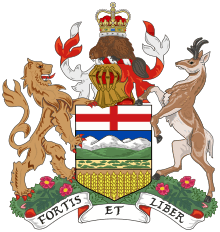23rd Alberta Legislature
The 23rd Alberta Legislative Assembly was in session from August 30, 1993, to February 11, 1997, with the membership of the assembly determined by the results of the 1993 Alberta general election held on June 15, 1993. The Legislature officially resumed on August 30, 1993, and continued until the fifth session was prorogued and dissolved on February 11, 1997, prior to the 1997 Alberta general election on March 11, 1997.[1]
| 23rd Alberta Legislature | |||
|---|---|---|---|
| Majority parliament | |||
| August 30, 1993 – February 11, 1997 | |||
 | |||
| Parliament leaders | |||
| Premier (cabinet) | Ralph Klein (Klein cabinet) 14 December 1992 - 14 December 2006 | ||
| Leader of the Opposition | Laurence Decore June 15, 1993 – July 15, 1994 | ||
| Grant Mitchell November 12, 1994 – April 17, 1998 | |||
| Party caucuses | |||
| Government | Progressive Conservative Association | ||
| Opposition | Liberal Party | ||
| Legislative Assembly | |||
| Speaker of the Assembly | Stanley Schumacher 30 August 1993 - 17 April 1997 | ||
| Members | 83 MLA seats | ||
| Sovereign | |||
| Monarch | Elizabeth II 6 February 1952 - present | ||
| Lieutenant Governor | Hon. Gordon Towers 11 March 1991 - 17 April 1996 | ||
| Hon. Bud Olson 17 April 1996 - 10 February 2000 | |||
| Sessions | |||
| 1st Session August 30, 1993 – February 9, 1994 | |||
| 2nd Session February 10, 1994 – February 12, 1995 | |||
| 3rd Session February 13, 1995 – February 12, 1996 | |||
| 4th Session February 13, 1996 – February 9, 1997 | |||
| 5th Session February 10, 1997 – February 11, 1997 | |||
| |||
Alberta's twenty-second government was controlled by the majority Progressive Conservative Association of Alberta, led by Premier Ralph Klein. The Official Opposition was led by Laurence Decore of the Liberal Party, and later Grant Mitchell. The Speaker was Stanley Schumacher.
Bills
Freedom of Information and Protection of Privacy Act
The Freedom of Information and Protection of Privacy Act (FOIP Act) is the freedom of information and privacy act for Alberta, Canada. It was passed by the Alberta Legislature in June 1994 and came into force on October 1, 1995.[2]
Civil Enforcement Act
The Civil Enforcement Act, S.A. 1994, c.C-10.5, is a law in Alberta, Canada. The law gave responsibility for seizures, evictions, repossessions, and enforcing court orders to authorized civil enforcement agencies. Sheriffs' Offices throughout the province closed, but The Office of the Sheriff - Civil Enforcement was created under the Court Services Division of Alberta Justice to monitor the civil enforcement agency activities and respond to complaints. The Act was proclaimed in force on January 1, 1996.
Party standings after the 23rd General Election
| **** | **** | **** | **** | **** | **** | **** | **** | **** | **** | **** | **** | **** | **** | **** |
| **** | **** | **** | **** | **** | **** | **** | **** | **** | **** | **** | **** | **** | **** | **** |
| **** | **** | **** | **** | **** | **** | **** | **** | **** | **** | **** | **** | **** | **** | **** |
| **** | ||||||||||||||
| **** | ||||||||||||||
| **** | ||||||||||||||
| **** | **** | **** | **** | **** | **** | **** | **** | **** | **** | **** | **** | **** | **** | **** |
| **** | **** | **** | **** | **** | **** | **** | **** | **** | **** | **** | **** | **** | **** | **** |
| **** | **** | **** | **** | **** | **** | **** | **** | **** | **** | **** | **** | **** | **** | **** |
| Affiliation | Members | |
| Progressive Conservative Party | 51 | |
| Liberal Party | 32 | |
| Total |
83 | |
Standing changes
- Paul Langevin, MLA for Lac La Biche-St. Paul, crosses the floor from the Liberals to the Progressive Conservatives in 1995.
References
- Perry, Sandra E.; Footz, Valerie L. (2006). Massolin, Philip A. (ed.). A Higher Duty: Speakers of the Legislative Assemblies. Edmonton, AB: Legislative Assembly of Alberta. p. 502. ISBN 0-9689217-3-6. Retrieved August 9, 2020.
- "FOIP - OIPC". Office of the Information and Privacy Commissioner of Alberta.
Further reading
- O'Handley, Kathryn, ed. (1997). The Canadian Parliamentary Guide. Scarborough, Ontario: Gale Canada. ISBN 1-896413-43-9. ISSN 0315-6168. OCLC 1156634080. Retrieved August 9, 2020.
- Office of the Chief Electoral Officer; Legislative Assembly Office (2006). A Century of Democracy: Elections of the Legislative Assembly of Alberta, 1905-2005. The Centennial Series. Edmonton, AB: Legislative Assembly of Alberta. ISBN 0-9689217-8-7. Retrieved May 25, 2020.
- Perry, Sandra E.; Footz, Valerie L. (2006). Massolin, Philip A. (ed.). A Higher Duty: Speakers of the Legislative Assemblies. Edmonton, AB: Legislative Assembly of Alberta. ISBN 0-9689217-3-6. Retrieved August 9, 2020.